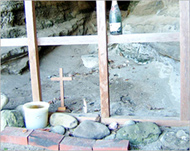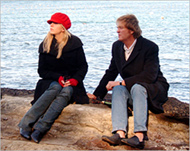Japanese courts frustrate UK family
The family of a British bar hostess who have waited four years to see justice in a Japanese court, believe they will have to wait at least another 12 months before sentence is passed on the man accused of killing Lucie Blackman.

In Japan earlier this month for the 25th hearing of a case that began at the Tokyo District Court in 2001, Tim Blackman and his daughter, Sophie, were told not to expect a conclusion to the killing that shattered their lives until at least next November because Japanese legal proceedings are so drawn out.
“We have met with the police and prosecutors and we had lots of questions for them, not least how much longer this is going to go on for,” Blackman said.
“We were warned that it would be drawn out, but it has been well over four years since Lucie died. That’s a large portion of our lives.”
As in all Japanese trials, three-hour hearings can be up to six weeks apart, giving the defence and prosecution time to develop their cases.
Lucie’s family has been frustrated by what it sees as complicated and drawn-out legal processes that are made even more difficult by the fact they live an 11-hour flight away.
Sense of closure
Despite the length of the case, the Blackmans said they felt a new degree of closure on 2 December when they visited the cave on a beach in the town of Miura, 50 miles southwest of Tokyo, where Lucie’s dismembered remains were discovered in February 2001.
 |
|
Tokyo’s nightlife districts draw |
“Until the closure of the case, the association for us in Japan is the cave and the beach,” Sophie Blackman said. Twenty-four-years old, she bears a striking resemblance to her sister.
Lucie was 21 when she died and had been in Japan for only two months. She was working serving drinks and chatting to Japanese businessmen in Tokyo, a job that many in the rest of the world mistakenly assume is merely a cover for prostitution.
The Blackmans spent a few minutes at the mouth of the cave, where local people have helped build a rudimentary shrine. They drank a toast of white wine on some nearby rocks overlooking the small bay and left the remaining third of the bottle at the entrance to the cave.
Lucie’s spirit
“When I arrived at the cave this time, it felt very different from before,” Sophie, who lives in Kent, southern England, said.
|
“I feel that Lucie’s spirit is edging back to England. It will be good to begin to take Sophie Blackman, |
“It’s not so symbolic now, although this place does still encapsulate her spirit and it is very peaceful, with the sea and Mount Fuji across the bay in the background.”
She added: “I feel that Lucie’s spirit is edging back to England and I don’t feel so attached to this place now. It will be good to begin to take her home now.”
Lucie disappeared on 1 July 2000 after agreeing to meet a customer from the Casablanca hostess bar in Tokyo’s Roppongi nightlife district.
According to Japanese prosecutors, the former stewardess with British Airways died of an overdose of a date-rape drug and was cut up with a chainsaw in an apartment belonging to Joji Obara, just 200m from the cave where her remains were eventually found.
He has been charged with kidnapping Lucie; rape resulting in her death; and with mutilating and abandoning her body.
Ponderous system
Obara is also accused of killing another woman, Australian Carita Ridgeway, in similar circumstances in February 1992, as well as six other specimen rapes. The 2 December hearing was to consider evidence concerning the death of Ridgeway.
Obara has admitted the rape charges, but continues to deny any involvement in the deaths of Sophie Blackman and Carita Ridgeway.
 |
|
Residents of Miura helped build a |
After leaving Miura, the Blackmans were in the Tokyo District Court for the hearing against Obara, but expressed their disappointment at the prosecution’s suggestion that the case will drag on for another year rather than the six months they had hoped for.
“They will not be moving on to Lucie’s case until next February and it is very noticeable how ponderous the system is,” Tim Blackman said. “It is difficult to see how much progress is being made.
“The prosecution say it will probably be this time next year before a ruling is made, and possibly even longer if the defence is obdurate,” he added.
Obara wore a grey suit and sat with his back to the Blackmans, who said he looked fatter than the last time they saw him in court, in November last year.
Absolute pity
“It’s stereotypical that I should feel overwhelming anger, but I don’t have that at all,” Sophie said. “Our loss as a family is so much greater than the anger we feel towards Obara. The thing I feel most is absolute pity for this pathetic individual.”
She works in the cardiology department of a London hospital, but is considering taking six months off to write a book about the experiences of her family, but also incorporating methods of dealing with losing a sibling.
 |
|
Lucie’s remains were discovered |
“I don’t know what I would consider an acceptable sentence for the court to pass, but anything that we consider lenient will make us very angry,” Sophie said. “Personally, I’d like him to rot in prison for ever.”
The family is also angry at the Japanese police for failing to act, despite indications that Obara had raped hundreds of women.
“The police found 1800 videos showing hundreds of women being raped in his apartments,” Tim said. “This had been going on for years and you can’t tell me that nobody went to the police to report it. That’s just not credible.”
To which Sophie added: “If the police had acted on the first case that was reported to them, or the second one, then Lucie would still be alive and dozens of women wouldn’t have gone through all that.”